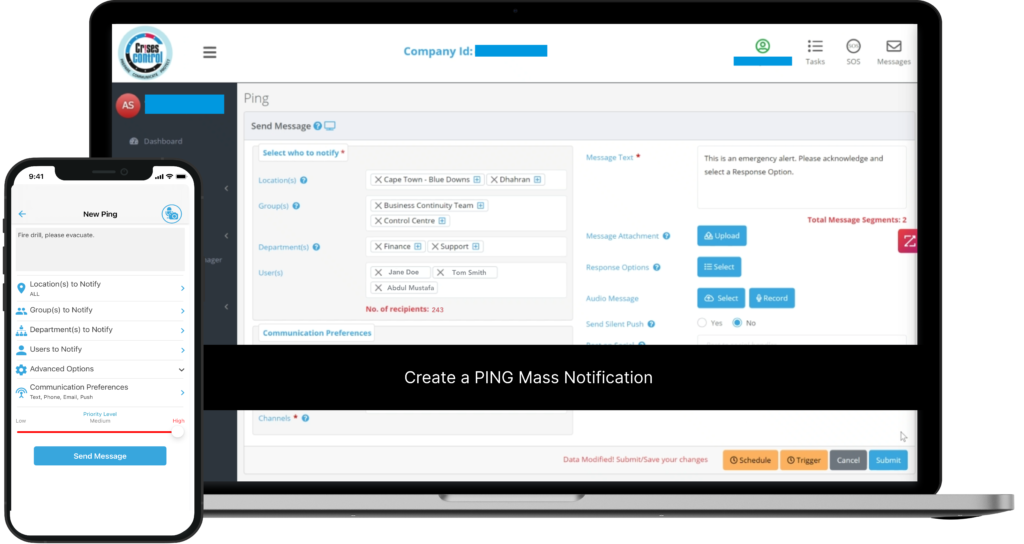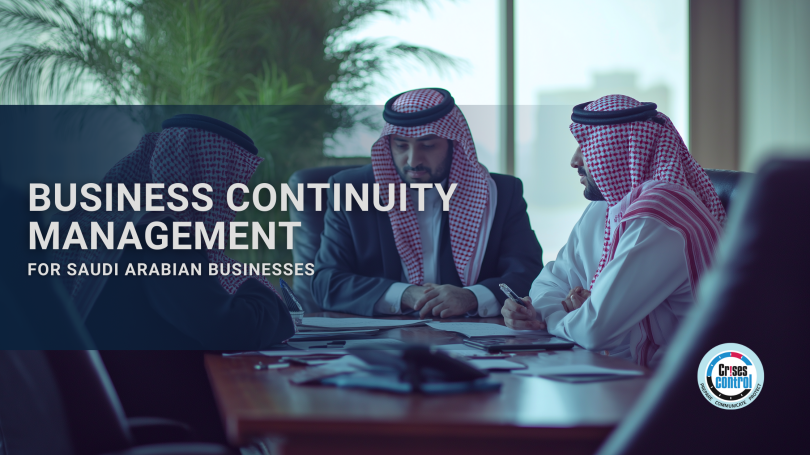Written by Anneri Fourie | Marketing Executive
In Saudi Arabia’s dynamic business environment, Business Continuity Management (BCM) has evolved from a nice-to-have into a must-have. Saudi companies face unique challenges—from sandstorms and extreme temperatures to regional security issues—making it essential to prepare for disruptions and ensure that their people, assets, and operations remain protected. While many companies have already implemented some form of BCM plan, having the ability to communicate quickly and accurately during a crisis can mean the difference between minor disruption and major loss.
That’s where a Mass Notification System (MNS) comes into play. Not only does an MNS ensure that critical information reaches the right people when it matters most, but it also strengthens BCM by supporting timely and effective emergency responses. Let’s explore why every Saudi business should include a Mass Notification System in its BCM strategy and how Crises Control can help.
Why Business Continuity Management is Essential in Saudi Arabia
Saudi Arabia’s business environment presents unique challenges. Companies operating here must contend with sudden sandstorms, flash floods, high temperatures, and even occasional security risks that can impact operations. For these companies, a solid BCM strategy doesn’t just reduce risks; it can prevent extensive downtime and protect lives.
Business Continuity Management is about more than just planning—it’s a proactive approach to handling emergencies so that a business can continue running with minimal disruption. BCM frameworks provide companies with the structure to respond to incidents, ensuring both employee safety and operational continuity. However, a plan is only as good as the communication that supports it. During an emergency, getting the message out swiftly and accurately is crucial to its success. And that’s precisely where Mass Notification Systems come in.
Why Speedy Communication Is the Heart of Business Continuity
When an emergency hits, time is of the essence. Effective communication can keep a small incident from turning into a significant crisis. By providing real-time updates and precise instructions, an MNS helps businesses respond in a controlled and coordinated manner.
The Role of a Mass Notification System in a Crisis
A Mass Notification System equips organisations to:
- Immediately alert employees and stakeholders of an incident—before it escalates.
- Reduce response time by coordinating updates as the situation evolves.
- Provide clear, location-based instructions so that employees know exactly what steps to take based on their location or role.
In Saudi Arabia, where sandstorms, power outages, and occasional security threats can disrupt daily operations, a Mass Notification System offers a way to communicate instantly and keep everyone in the loop. This rapid communication can make a world of difference, turning a chaotic event into a controlled situation and reducing the risk of escalation.
What Is a Mass Notification System, and How Does It Work?
A Mass Notification System is more than a simple messaging tool—it’s an integrated platform that sends alerts to employees and stakeholders across multiple channels like SMS, email, push notifications, and even voice calls. The most effective MNS solutions go beyond mass alerts to deliver specific, actionable information to the right people, at the right time.
Key Features of an Effective Mass Notification System
- Multi-Channel Alerts: Ensure that messages reach employees through their preferred or most accessible channels, so no one misses critical information.
- Geo-Targeted Notifications: Send location-specific alerts so that only the affected areas or teams receive the relevant instructions.
- Two-Way Communication: Allow employees to respond, providing real-time feedback and enabling better situational awareness.
- Automated Alerts: Trigger predefined alerts in response to specific events, like a weather warning or security threat, so that response plans activate instantly.
By integrating these features, an MNS does more than send out messages—it turns BCM plans into actionable, effective steps that can be implemented in real-time. In high-stakes situations, this communication flow can prevent incidents from escalating, saving businesses both time and resources.
Navigating Saudi Arabia’s Unique Business Continuity Challenges
Certain industries in Saudi Arabia, like oil and gas, construction, and hospitality, are particularly vulnerable to regional risks. Each of these sectors faces distinct challenges that require an adaptable, robust Mass Notification System to support their BCM plans.
Sector-Specific Challenges
- Oil and Gas: Facilities in the oil and gas sector operate in high-risk environments prone to environmental hazards and security threats. An MNS can provide instantaneous communication to on-site personnel, ensuring that everyone is aware of safety protocols and can act quickly in case of an emergency.
- Construction: Construction sites often span large, sometimes remote areas, where communication can be challenging. From weather disruptions to on-site accidents, a Mass Notification System allows for immediate alerts and can help manage incident responses effectively, no matter the location.
- Hospitality and Retail: With a focus on public-facing services, the hospitality and retail industries need to prioritise customer and employee safety. A Mass Notification System can instantly alert all employees about potential security or safety threats, enabling them to protect guests and themselves in real-time.
Regardless of industry, the common thread is the need for clear, swift, and precise communication when it matters most. A Mass Notification System provides the framework for just that, ensuring that employees are informed, prepared, and able to act quickly.
How Mass Notification Systems Bolster Business Continuity
By supporting swift communication, a Mass Notification System helps keep operations intact and ensures the safety of all involved. Here’s how an MNS directly supports Business Continuity Management in Saudi Arabia:
1. Enhanced Employee Safety
When incidents occur, the safety of employees is paramount. With a Mass Notification System, companies can:
- Quickly alert employees about threats or incidents.
- Give clear instructions on how to respond—whether that means evacuating, sheltering in place, or following specific procedures.
- Confirm that messages have been received and that employees are safe.
2. Operational Continuity
Operations often get disrupted by emergencies, but an MNS allows your BCM team to coordinate and adjust in real-time, keeping essential functions running. This includes:
- Providing instructions on temporary process adjustments to keep operations flowing.
- Informing employees of available resources, supplies, or backup workflows to maintain productivity.
By ensuring timely, clear communication, an MNS keeps disruptions minimal and allows the business to resume normal operations faster.
3. Compliance and Accountability
Certain industries, like oil and gas, are heavily regulated when it comes to safety and crisis preparedness. An MNS makes it easier to track all communications during an incident, offering a detailed log that’s invaluable for post-incident audits and compliance checks.
Why Crises Control’s Mass Notification System Is a Smart Choice for Saudi Businesses
For Saudi businesses looking to enhance their Business Continuity Management, Crises Control’s Mass Notification System offers purpose-built features tailored for effective emergency communication.
Key Advantages of Crises Control’s MNS
- Multi-Channel Alerting: Crises Control reaches employees across SMS, email, app notifications, and more, so that everyone stays informed, regardless of their location.
- Geo-Targeting: With geo-targeting capabilities, Crises Control ensures that only employees in affected areas receive alerts, reducing unnecessary disruptions.
- Automated Notifications: Pre-programme notifications for specific scenarios—like severe weather alerts or security incidents—to reduce manual intervention during high-stress situations.
- Two-Way Communication: Real-time feedback allows your team to assess and adjust as new information becomes available, ensuring a responsive and flexible approach to incident management.
- Comprehensive Reporting and Audit Logs: Crises Control provides detailed communication records, helping your team meet regulatory requirements and conduct thorough post-incident reviews.
With Crises Control, Saudi businesses gain the confidence that they are equipped to handle any crisis, minimising risks and ensuring continuity.
Interested in our Ping Mass Notification System?
Efficiently alert everyone in seconds at scale with our Mass Notification System – PING, get the message out fast and ensure rapid response and recovery.

Practical Scenarios Where Crises Control’s MNS Makes a Difference
To illustrate the real-world impact of Crises Control’s MNS, let’s consider a few scenarios:
- Manufacturing: In the event of a chemical spill, Crises Control’s geo-targeted alerts notify only those in the affected area, guiding them to evacuate while allowing other areas to continue operations safely.
- Oil and Gas: For a pipeline emergency, Crises Control sends alerts with specific instructions based on each person’s location and role, ensuring that response efforts are both safe and coordinated.
- Retail and Hospitality: During a security incident at a hotel, Crises Control’s instant alerts guide employees in securing areas, notifying guests, and implementing safety measures effectively.
These examples showcase Crises Control’s flexibility in adapting to various industries and types of incidents, making it a trusted choice for businesses in Saudi Arabia.
Conclusion: Strengthen Your Business Continuity with Crises Control
In today’s business environment, a Mass Notification System is not optional—it’s essential for effective Business Continuity Management, especially in Saudi Arabia. By enabling fast, clear communication, an MNS can save lives, protect assets, and prevent minor incidents from turning into major disruptions.
Crises Control’s Mass Notification System offers the tools needed to strengthen crisis responses and maintain business resilience. Whether you’re in oil and gas, retail, manufacturing, or another sector, Crises Control has a proven solution that can enhance your BCM.
Don’t wait until the next crisis strikes—contact us today to request a free demo and see how Crises Control can be your partner in ensuring a safer, more prepared business environment.
Request a FREE Demo

